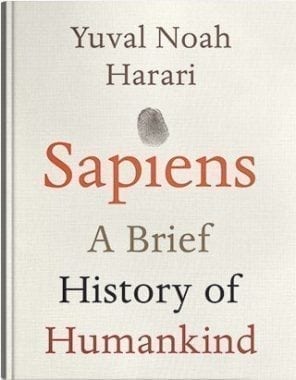It was back in the fall that I went to the bookstore with a couple of coworkers at lunch, and we came across a display of Sapiens. I recognized the author's name as that behind Homo Deus, which my mother had been telling me about because she thought it would interest me (and she was right), having heard Harari in interview on one of her many news channels. So I pointed the book out to my coworkers, and before I new it they were both buying a copy. (At this point, I was still hoping that someone would get me the future-looking Homo Deus, rather than the history-based Sapiens, for my birthday.) Then started the raves, and the campaigning to "do" Sapiens for book club.
Fast-forward six months. We did indeed last week discuss parts 1 and 2 (of 4) of Sapiens at book club. We went more than three hours and spent most of it at each other's throats. Fighting mostly about feminism, I think, while mostly sober.
This book is provocative. It's not that Harari puts forth any contentious arguments — I'm hard-pressed to pinpoint anything I may actually have learned — it's merely the fact that these subjects were gathered and presented together. Things we take for granted but that we need to talk about. Capitalism. Racism. Sexism. Humankind's violent nature(?).
Some sections seem a little simplistic; that can't be avoided in a book with such ambitious scope.
I'm finding the book to be weirdly judgmental; Harari explains history on this grand scale and that it couldn't've unfolded any other way, but then blames us for it. I can't decide whether this is careless or deliberately manipulative in order to spur action to quell our darker nature, but if the latter is the case, it risks antagonizing the audience it needs to reach and preaching to the choir. Ultimately, where we've been, were we are, and where we're going — it's all inevitable.
I'm not very good at reading nonfiction, so I appreciated having book club as an incentive. I do plan on reading the second half of the book, but I may take a little break before getting back to it.
See also:
Harari's most recent article on the meaning of life in a world without work:
To the best of our scientific knowledge, human life has no meaning. The meaning of life is always a fictional story created by us humans.It sounds like Harari is saying in this essay that in the future, we will all play video games all day long. But I will give Harari the benefit of the doubt that his writing is sloppy, that he does not intend to insult humanity and be so casually dismissive of our choices, that he is trying to express the more meaningful fact that humans are adept at constructing realities to occupy and amuse themselves.



1 comment:
Human life is not without meaning. It has been created with a definite purpose of doing struggle to choose between right and wrong. Life is a test and a challenge.
Post a Comment